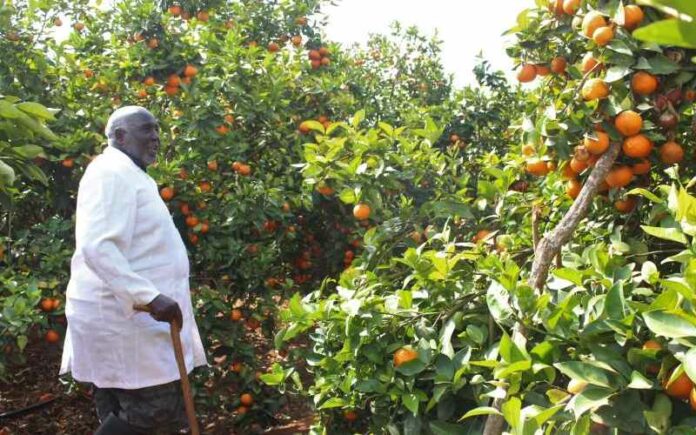Peter Mwaka, a retired teacher, is the owner of Joyland Farms in Makueni County. The farmer has filled his 30 acres with oranges.
He is regarded as the Pixie fruit kingpin in the Makueni region. From corner to corner, Mwaka’s farm is an endless maze filled with blossoming orange fruits. Others are still flowering.
Mwaka has planted three varieties on his farm; the Washington Novel, bell-shaped Minneolas and Pixies.
He has planted over 4,000 citrus fruit trees with Pixies being the most popular and sweetest. Additionally, Mwaka grows rough lime and yellow lime.
In a farm tour interview, the retired educator revealed that his farm produces between 50-70 tonnes of Pixie fruits between the June and September season. This is in addition to the produce he reaps from other citrus fruits.
A kilo retailing between Sh. 80 and Sh. 120 always ensures that the farmer consistently rakes in good money over the years.
Mwaka has been a citrus fruit farmer for nearly 50 years. He established his farm in 1976. At this time he was getting started in his teaching profession. The farmer would intercrop his tress with maize and pigeon peas.
He realised good margins from the sale of his farm produce in his first few harvest seasons. But what caught his eye was how well the oranges did.
Eventually, the farmer phased out the other crops and solely focused on the oranges.
Peter Mwaka credits his father, a church elder and man with resolute military bearing, for his success. He taught him how to have a strong work ethic, which shaped his character.
The 74-year-old farmer has strived to pass these values down to his 6 children. Mwaka would always wake them up at 3 am to till the land using ox-drawn ploughs under lantern lights.
“They might have thought I was a bother to them but today they have seen the fruits of hard work,” the multi-millionaire farmer stated.
Quit teaching job for farming
Mwaka’s best decision in life to leave his profession for the farm full-time came as a result of a misunderstanding with the school.
Mwaka was often a late-comer, even if he was the teacher on duty. His morning routine to check on his farm before leaving for school, saw him at loggerheads with touring education inspectors.
He recalls arriving at school and finding inspectors at the parade. Afterwards, he was summoned to the headteacher’s office and tongue-lashed.
This was in 2010. Mwaka was already making some good fortune from his farm.
“But I told them I couldn’t arrive early as much as I wanted. I told them I needed first to improve my home’s score however much I wanted to improve the school’s mean score,” he fondly remembers with a smile on his face.
After school, he borrowed a typewriter, hammered his resignation letter and forwarded it to the school the following day. This was his ticket to the big time.
“That year alone, I got more money than I had in my 37 years of teaching. I bought my first car, a brand new car from the UK and remained with enough money to invest,” Mwaka remembered.
Justus Kimeu: Farmer reaping millions from planting Pixie Oranges in dry Makueni lands
Planting
Joyland Farm produces fruits all year round. It however has its peak season. He obtains water from his farm from a stream that passes near his farm.
Mwaka has constructed basins around each tree. Each basin consumes 3 jerricans, each 20 litres.
“You have to flood the basin with water every 3 weeks. This way, coupled with the right pesticides will give you fruits throughout the year,” he stated.
When competition is stiff in the market, the farmer subjects his plants to stress for at most 2 months. This means that he denies them water so that he can beat the market curves.
“After the stress, you give them water and they burst into flower buds ready to give fruits.”
Marketing
Mwaka’s Toyota Hilux pick-up is ever on the road doing deliveries, mostly to his Nairobi customers. He trades with juice manufacturing companies, supermarkets and even exporters.
Between 2016 and 2018, Mwaka supplied Pixies to Naivas Supermarket. He recalled raking in a fortune, given he would supply between 1000 and 1500 kilos weekly.
“They gave me a good price of Sh. 170 per kilo and I would deliver 3 times per week,” he said.
In hindsight, selling to supermarkets can be disadvantageous if fruits rot while on the shelves. One time, he lost Sh. 120,000 from oranges that went bad. This money was deducted from his next supply.








